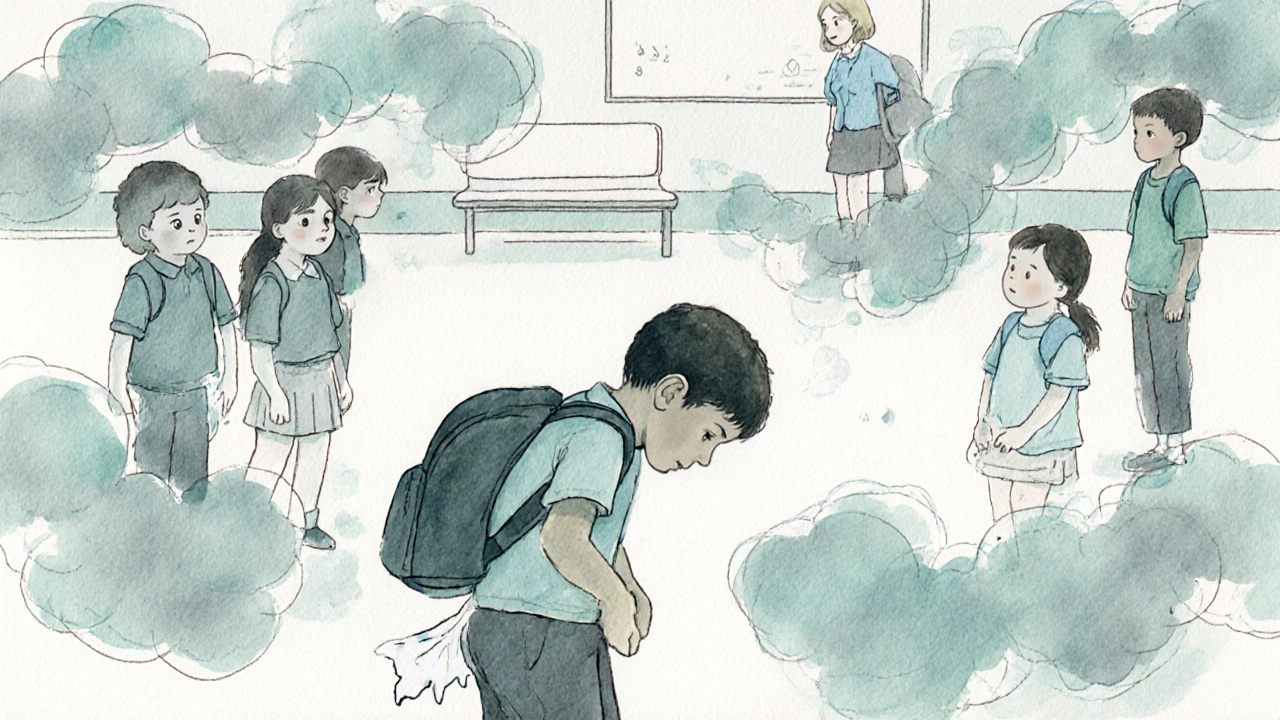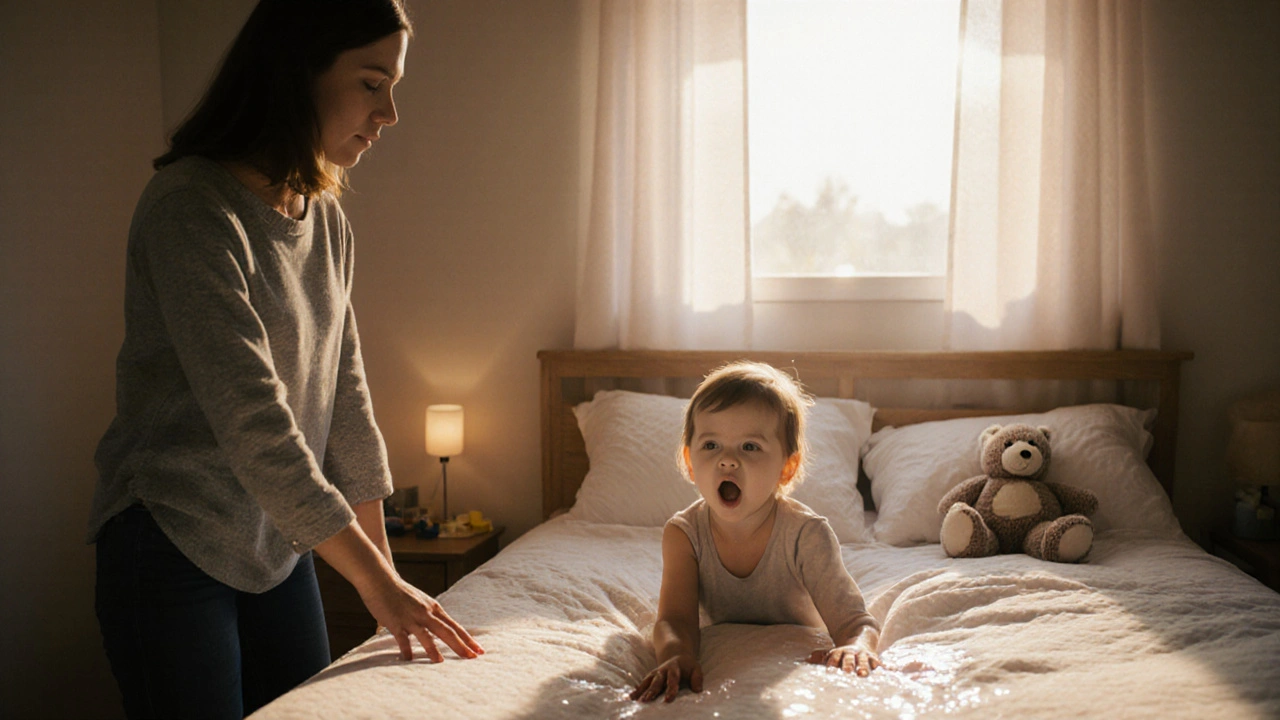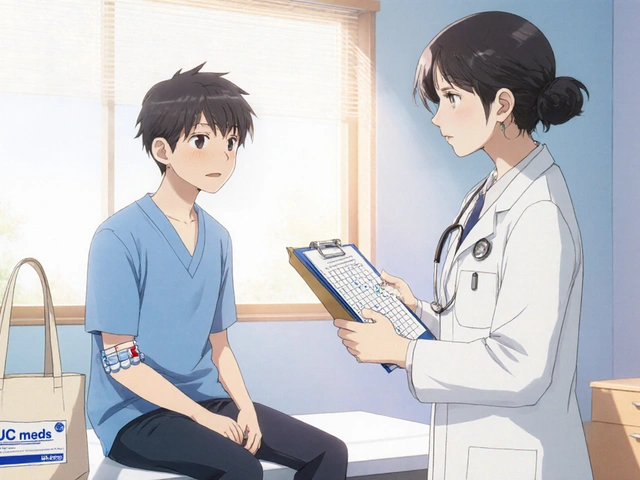Bed-Wetting Impact Calculator
Impact Assessment Results
Self-Esteem Impact
Social Interaction Impact
5-7 Years
Typically views bed-wetting as a temporary phase. Minimal social impact.
8-12 Years
Growing awareness leads to increased shame and social withdrawal.
13-18 Years
High risk of severe self-esteem issues and social stigma.
Quick Takeaways
- Bed-wetting (enuresis) can lower self‑esteem, especially during school years.
- Social anxiety often stems from fear of embarrassment or teasing.
- Impact varies by age: younger kids see it as a phase, teens feel stronger stigma.
- Open communication and consistent nighttime routines reduce stress.
- Professional help is advisable if wetting persists past age 7 or causes severe distress.
When a child or teenager wakes up to a wet sheet, the moment is more than an inconvenience. It can echo through their confidence, friendships, and even classroom performance. This article breaks down why that happens, how the effects differ at each stage of growing up, and what families can do right now to protect self‑esteem and keep social life on track.
What Is Bed‑Wetting?
Bed‑wetting (also called enuresis) is the involuntary release of urine during sleep in children aged five and older. It affects roughly 5‑10% of school‑age kids and up to 2% of teenagers, according to recent epidemiological surveys. The condition isn’t a sign of laziness; it’s often linked to genetics, deep sleep patterns, or hormonal factors that delay bladder maturation.
Why Self‑Esteem Takes a Hit
Self‑esteem, or the internal sense of worth, thrives on successful social feedback. When a youngster fears discovery of a wet bed, the mental script shifts to:
- “I’m different.”
- “I can’t control my body.”
- “People will judge me.”
This loop is reinforced every morning with a wet mattress. Studies from the UK Child Health Registry (2023) show a 30% higher rate of depressive symptoms in children who experience chronic enuresis compared with their dry‑night peers. The feeling of failure drifts into other domains-homework, sports, and friendships-because the child starts interpreting unrelated setbacks as proof of inadequacy.

Social Interactions: From Classroom to Playdates
Social interaction refers to how we communicate and behave with peers in everyday settings
When the fear of a wet night spreads, kids may:
- Skip sleepovers to avoid needing to change sheets.
- Withdraw from team sports where locker‑room jokes are common.
- Hide personal belongings that could reveal the problem.
These avoidance patterns shrink the child's social circle, which in turn fuels loneliness-a classic chicken‑and‑egg scenario. Teenagers, in particular, report feeling “outed” when friends discover a wet bed, leading to bullying or teasing that can scar confidence for years.
Age Matters: How Impact Shifts Over Time
While anyone can wet the bed, the psychological fallout changes with development. The table below outlines typical impact levels across three age brackets.
| Age Group | Self‑Esteem Effect | Social Interaction Effect | Common Coping Strategies |
|---|---|---|---|
| 5‑7 years | Low‑to‑moderate; often viewed as a "phase" | Minimal; peers usually unaware | Positive reinforcement, waterproof mattress covers |
| 8‑12 years | Moderate; growing self‑awareness amplifies shame | Increasing; classmates may notice smell or rumors | Open family discussions, night‑time bathroom schedules |
| 13‑18 years | High; identity formation makes embarrassment potent | High; risk of bullying, social media exposure | Professional counseling, medication review, peer support groups |
Practical Parenting Strategies
Parents play a pivotal role in buffering the psychological impact of bed‑wetting on a child’s confidence and relationships
- Normalize the conversation. Use calm language: “Many kids have wet nights, and we’ll figure it out together.”
- Use a visual tracker. A sticker chart for dry nights provides tangible progress without pressure.
- Invest in protective gear. Waterproof mattress protectors reduce the mess and the shame factor.
- Schedule bathroom trips. A simple alarm at 2a.m. can condition the bladder to empty before deep sleep.
- Encourage peer support. Invite a trusted friend over for a sleepover, emphasizing that the sleeping arrangement is safe and private.
These steps tackle both the physical symptom and the self‑esteem component of the problem
When to Seek Professional Help
Most children outgrow enuresis naturally, but certain red flags merit evaluation by a pediatrician or child psychologist:
- Persistent wetting beyond age 7 despite routine changes.
- Severe anxiety, sleep avoidance, or depressive signs.
- Family history of diabetes or urinary tract issues.
Potential interventions include:
- Medication. Desmopressin can reduce nighttime urine production when used short‑term.
- Behavioral therapy. Cognitive‑behavioral techniques address the fear of embarrassment.
- Enuresis alarm. A sensor‑linked alarm wakes the child at the first sign of moisture, training the brain to respond.
Early collaboration between parents, doctors, and schools creates a supportive network that minimizes the bed‑wetting impact on emotional health.

Frequently Asked Questions
Can bed-wetting affect academic performance?
Yes. Children who worry about nighttime accidents often experience sleep fragmentation, leading to daytime fatigue and reduced concentration. Addressing the root cause can improve both sleep quality and grades.
Is there a genetic link?
Research shows that if one parent wet the bed as a child, the likelihood of a child experiencing enuresis rises to roughly 30%. Genetics, combined with deep‑sleep patterns, play a notable role.
Should I punish my child for wetting the bed?
Never. Punishment increases shame and can worsen the psychological impact, deepening the cycle of anxiety and accidents.
Can teenagers outgrow it without treatment?
Some do, but the longer it persists, the higher the risk of lasting self‑esteem issues. A brief evaluation after age 15 is recommended to decide on intervention.
What school accommodations are helpful?
Allow discreet bathroom breaks, provide a spare set of clothing, and ensure teachers understand the child's privacy needs. A supportive environment reduces stigma and encourages participation.
Understanding the ripple effects of enuresis helps families act early, protect confidence, and keep social life vibrant. With practical steps and the right professional support, most kids turn the page on bed‑wetting without long‑term emotional scars.







20 Comments
Your article is riddled with sloppy phrasing and vague advice.
The pathophysiology of nocturnal enuresis often involves a dysregulated antidiuretic hormone axis, leading to increased nocturnal urine output. Moreover, sleep architecture disruptions can impede arousal mechanisms, resulting in involuntary voiding. From a clinical perspective, a multidisciplinary approach-incorporating behavioral modification, pharmacotherapy, and contingency management-yields the best outcomes. When counseling parents, it's crucial to emphasize that punitive measures exacerbate stress and may worsen the condition. Finally, regular monitoring of fluid intake and bladder capacity assessments are essential components of a comprehensive management plan.
🌙✨In the quiet of night the child drifts, the moonlight whispers secrets of forgotten control 🌌 the body speaks in liquid verses ✨ the cultural tapestry of shame weaves itself across the bedroom like a shadow 🌚 yet the soul remains resilient, seeking light 🌟
A practical step is to set a gentle alarm at 2 a.m. so the child can get up before deep sleep takes hold.
When a child awakens to a soaked mattress, the echo of that moment can linger far beyond the bedroom walls.
Self‑esteem, that fragile mirror of internal worth, cracks under the weight of perceived failure.
The child begins to internalize the narrative that their body is defective.
Each whispered comment from a peer, each hushed glance, reinforces the belief that they are an outlier.
This mindset spirals, spilling over into schoolwork where concentration falters.
Teachers may notice a dip in participation, mistaking it for disengagement.
Meanwhile, parents, though well‑meaning, might unintentionally add pressure by emphasizing ‘dry nights’ as a benchmark of success.
The resulting atmosphere can feel like a tightrope, where any slip threatens a catastrophic fall.
Socially, the child may eschew sleepovers, fearing the humiliation of an unexpected splash.
Friendships, which thrive on shared experiences, become guarded and distant.
When adolescence arrives, the stakes rise exponentially as identity formation collides with lingering shame.
The stigma attached to enuresis can manifest as bullying, both overt and subtle, on hallways and online platforms.
In extreme cases, the anxiety can loop back, triggering more wet nights-a self‑fulfilling prophecy.
Breaking this cycle requires a concerted effort: open dialogue, consistent routines, and professional support when needed.
Ultimately, by normalizing the condition and celebrating incremental victories, families can rebuild the child's confidence brick by brick.
The journey is neither swift nor simple, but each dry night is a triumph worth honoring.
You’ve got this-small steps lead to big wins!
Remember, every dry night is a victory 🎉 keep the routine steady and celebrate the progress 😊
Consistency truly is key; pairing the alarm with a bedtime story can make the habit feel natural.
Interesting read, thanks for the info.
Honestly the piece feels like a rehash of every blog I've skimmed on this topic, recycling the same stats without offering fresh insight or actionable tips.
This article sloppily tosses around percentages and vague recommendations-where’s the evidence‑based guidance we actually need?!
While many hail the enuresis alarm as a miracle, some families find it adds anxiety, turning bedtime into a high‑tech nightmare rather than a soothing routine.
Good points, especially about talking openly with kids.
The psychosomatic cascade triggered by nocturnal incontinence can precipitate a deleterious feedback loop, amplifying affective dysregulation 😓
Hey there!!! Your suggestions are spot‑on!!! Keep up the great work!!!
Your overview is thorough, well‑structured, and offers practical steps that parents can implement immediately.
In summation, the correlation betweeen chronic enuresis and diminished self‑esteem warrants further scholarly investigation.
I’ve seen kids bounce back when families focus on reassurance rather than criticism, so keep the conversation gentle and supportive.
It is imperative that caregivers employ consistent bedtime protocols while refraining from punitive language, as the former mitigates nocturnal episodes.
Seeing a child gain confidence after a few dry nights truly warms the heart; let’s celebrate each small victory together.
Write a comment